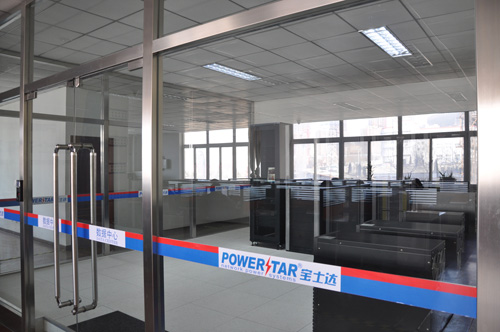
Internet Data Center (IDC) and Multimedia Data Centre (MDC) is the control center of the high-speed Internet. The clients have extremely high requirement for the "timeliness" of remote process, storage and transmission of information resources (data, audio and image). Even a few seconds of downtime will bring incalculable losses to the entire safe operation of Internet and clients. It may even cause serious paralysis of the social and economic life. Therefore, IDC must provide 365 × 24h continuous high-speed, safe, and reliable service for the clients. For this purpose, the entire power supply system for IDC room must apply a solution of high degree of "fault tolerance" when there occurs a failure in modules, or a breakdown during routine maintenance they have to make sure that the equipment are supplied by online UPS, but not by mains or emergency generators through bypass. This is because only "on-line UPS inverter power are capable of providing the loads with high-quality sine wave power of regulated voltage, stable frequency, non-interference and waveform distortion. For Non-on line UPS like backup UPS and line interactive UPS, they mainly regulate the input voltage, and do not have a substantive improvement. This means that there should be no single point of potential "bottleneck" in the entire power supply system.
Therefore, clients should use a redundant UPS power supply system with high fault tolerance. In other words, the entire UPS system must be able to work properly even if some of the "parts" fails accidentally.
Compared to the traditional UPS, those configured with modular (N + X) in the dual bus system have morer advantages than others. Clients always have a wrong estimation (higher or lower) in their construction of their power supply system for information network, which often results in high cost, thus unable to meet the load needs, or a waste of resources, space and energy. Modular (N + X) UPS can effectively solve this problem by its scalable module structure.
Modular UPS is considered to be one of the development trend of the UPS. The high frequency modular DC power supply for communications has set a good example for modular UPS. Modular power supply have not only been greatly improved in the performance indicators, but also made epoch-making improvement in reliability, maintainability, and intelligent, which are embodied in the following characteristics:
●High scalability:
Modular UPS solution is not only to provide protection for clients, but also a scalable solution which can be added and removed online to meet the clients’ future demand like online maintenance and expansion.
1, the increase of capacity can be simply achieved by increasing the numbers of modules instead of purchasing a new machine;
2, reduce the cost of initial purchase, post-expansion, and maintenance.
●High reliability:
UPS’s reliability is equal to improvement of MTBF plus redundancy, so the UPS system applies redundant technology to eliminate the single point bottlenecks in the system. This is the main way to improve reliability of UPS systems.
1. all power module in the system bear the power capacity averagely;
2,.in case of any module failure, remaining modules will automatically share the load to ensure normal operation of the systems;
3, all modules have the ability to run independently, and do not need a system controller;
4, the system will automatically reduce redundancy when the load increases and ensure the normal operation of the system;
5, capable to constitute a redundant system of N +1 to N + X;
6, capable to achieve N+1 to N+X times redundancy.
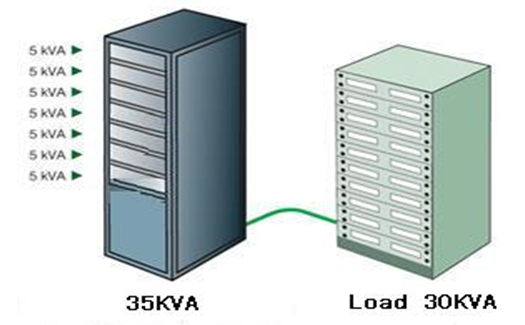
Modular UPS origins from new technical breakthrough:

The emergence of modular UPS is a revolution in the traditional UPS operation mode, which enhanced the reliability of the UPS.
●High availability:
Availability = MTBF / (MTBF + MTTR)
MTBF = mean time between failures
MTTR = mean time to repair
Stand-alone UPS availability = 200,000 / (200,000 +120) × 100% = 99,940%
Module UPS availability = 700,000 / (700,000 +5) × 100% = 99,999%
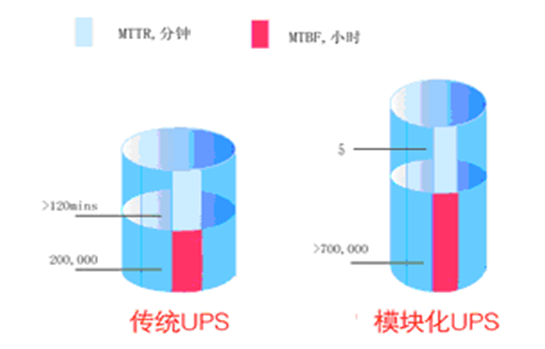
1. A single module failure does not affect the normal operation of the system, so clients do not need to stop and wait for maintenance. So there will be no loss caused by UPS module failure;
2. Technical personnel can directly replace the module instead of excluding the failure point. Clients can do self-maintenance if they have spare parts;
3. Mean time to repair declines from 8 hours to 5 minutes (online);
4.Simplified spare parts and equipment, and reduce user’s costs and the price of service contracts;
5.When the monitoring module fails, the UPS can still maintain a normal output without transferring to bypass;
6. Clients may proceed system maintenance at any time, and do not need to wait until the overhaul, which will reduce the failure risks;
7. Extremely high reliability and stability to ensure the best protection for the loads.
Extreme availability highlights the power system with perfect protection and safe use, and ensure protection time of system itself and the loads increase exponentially.
●High maintainability
UPS module, STS modules, communication modules are hot-swappable, easy to use and safe;
Maintain and, repair UPS without transferring to bypass, so that the load may get the most protection time;
Online expansion or increase the amount of redundancy.
●High Efficiency and Energy-saving:
Modular UPS input THD is lower than 3%, the power factor may reach 0.99, the overall efficiency is more than 95%, and mean time between failure are 700,000 hours, which can effectively reduce the network load, realise energy efficiency of UPS power supply input. With high overall efficiency, low heat and energy loss, UPS can greatly increase energy efficiency to save energy.
Energy saving has become a basic national policy today. Energy conservation has become the need of enterprise development and competition. Power-saving is a reflection of energy-saving. Compared to traditional UPS, the modular UPS becomes more prominent in power-saving.
Based on the above data, according to saving costs of one year, we can conclude the following table:
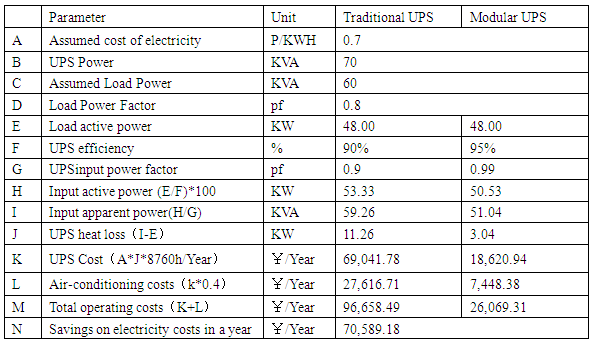
The above table is based on full load case, modular UPS annually saved about ¥70,000. If considered relately low load at the beginning, energy-saving effect will be more apparent.
●High Efficient investment
UPS actual operating efficiency is more than 95%;
Small footprint 2000 (H) x 600 (W) x 800 (D) mm;
Compared to traditional UPS, Modular UPS power supply and air-conditioning can save 25% of the energy cost, with less room space and air-conditioning capacity. it has significant energy saving effect.
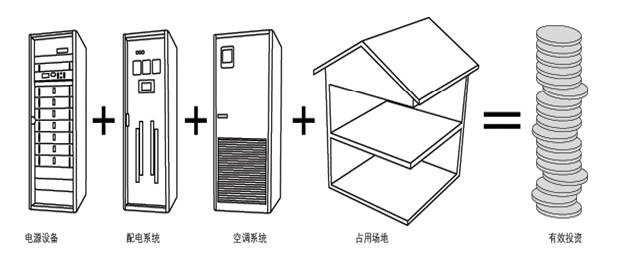
●High efficiency, no pollution, low energy consumption:
Clients focus more on the adaptability of the business development to the environment and the impact on the ecological environment with their investment. When they are Focusing on the economic benefits, they also pay more attention to their social responsibility.
High Efficiency: overall efficiency≥ 95%, inverter efficiency ≥ 97%, small heat loss;
Pollution: input THDI ≤ 3%, input power factor = 0.999, effectively reducing the interference of the harmonic currents on the grid and noise pollution;
Low power consumption: high efficiency can effectively reduce heat loss – Energy-saving
Low THDI can reduce the energy consumption brought by harmonic current– Energy-saving
●Green shield:
Modular UPS comply with electromagnetic compatibility characteristics of the industry test standards, including conducted interference, radiated interference, conduction immunity, power drop, the group pulse, electrostatic discharge, surges, and other special content. The excellent electromagnetic compatibility characteristics can not only filter out all kinds of grid disturbance, effectively reduce and eliminate the interference generated by the UPS itself, and guarantee high-quality power equipment, especially suitable for communications, finance, production line control system, key equipment areas of e-government professional applications.
comprehensive comparison between Modular UPS and Traditional UPS








 Copyright © 2003 - 2023 . All Rights Reserved
Copyright © 2003 - 2023 . All Rights Reserved